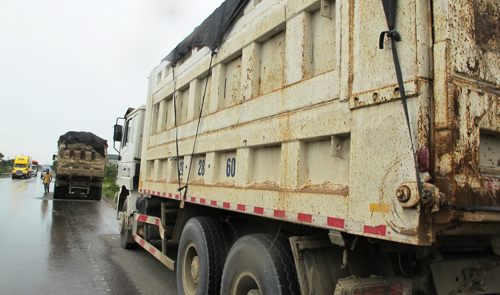Although mobile weighbridges have been deployed across Vietnam, self-modified trucks carrying overloaded cargo still frequent many localities. Ha Tinh Province is emerging as a hotbed for such vehicles.
The most common parts of a dump truck that are often modified include the open-box bed, leaf spring suspension, and tire compound. Such improvements are made so that a modified truck can carry more than its original capacity.
In the single month of April this year, transport authorities in Ha Tinh fined 138 drivers for the unlicensed self-modifications.
The violations in the central provinces of Ha Tinh and Nghe An have been so rampant that the Transport Minister Dinh La Thang conducted checks on local highways 1A and 12 in the middle of June.
“Ha Tinh will pay attention to oversized open box beds on self-modified trucks and punish violators,” reads one report from the Ha Tinh transport department.
Despite local authorities’ promise to strictly punish such violations, they admit that it is difficult to put an end to violations all together.
Truck box enlarged 40cm in height
On the morning of June 27, Tuoi Tre (Youth) newspaper journalists saw a series of dump trucks with modified boxes driving on National Highway 1A from Ha Tinh City, the capital of Ha Tinh Province, to Cam Xuyen, a town in the province.
Many of the trucks were carrying materials for contractors who are working on upgrading National Highway 1A.
Chinese-made trucks such as Dongfeng and Howo are often modified to have boxes up to 20-40cm in height to carry materials for local stone mines such as Ky Tan and Khe Da Dan in Ha Tinh Province.
A Howo truck driver working at the Khe Da Dan mining site said his truck is registered to carry over 10 tons but he enlarged his truck box in order to carry over 35 tons of goods, excluding the weight of the truck at 15 tons.
“Most trucks carrying cargo here enlarge their boxes in order to have more loading capacity,” the driver admitted.
“I know overloading will worsen roads and cause pollution, but I am just a hired driver.”
A driver at the Mien Nam (Southern) garage in Ky Anh District, Ha Tinh Province revealed that, “One can attach slots and sideboards at the upper side of the truck box to slip in metal sheets to enlarge it.
“The sheets are quickly uninstalled when local authorities come to check.”
Vo Ngoc Son, director of a registry unit in Ha Tinh, said his agency keeps a detailed profile of their trucks including image, technical data, tire standards, and size before it is granted a license to drive on the road.
“However, dealing with overloaded trucks on roads is the job of other forces such as traffic policemen, not the registry branch,” Son said.
It is easy to prove a truck is carrying overloaded cargo by comparing the real size of a truck with its registered size, he added.
Major Bui Duc Thuan, vice head of the Ha Tinh traffic police department, said his staff has never loosened their rules of overloading, but conceded that it is hard for traffic police to stop the violations.
“Drivers are informed of the presence of traffic policemen on streets and find ways to evade them. They even memorize the hours that the police work.
“Some days, we intercept three or four violations, although overloading is spreading in Ha Tinh Province.
“Drivers even park by the roadside, lock their truck cabin, and leave. They only return when traffic policemen go away.”
In other localities
Drivers are overloading their trucks in many provinces other than Ha Tinh.
There have been reports that staff of mobile weighbridges in the southern province of Dong Nai and the Central Highlands province of Lam Dong take bribes to allow overloaded trucks to pass through without being fined.
In Vietnam, both traffic police and transport management have the right to punish traffic violations.
Instead of stopping drivers from carrying overloads, weighbridges have created a ‘game of chance’ played by drivers and transport officials who operate the machines. The game is commonly called ‘wait and run.’
Bribery complicates the game.
Under ‘normal conditions,’ drivers of overloaded trucks call their intermediaries to bribe corrupt transport officials to ignore them.
When such acts are marred by ‘sudden’ law enforcement, overloaded trucks stop to wait and drive away whenever they have the chance. This may be when the power goes out, during a change in shifts, or while it is raining.
Like us on Facebook or follow us on Twitter to get the latest news about Vietnam!



















































